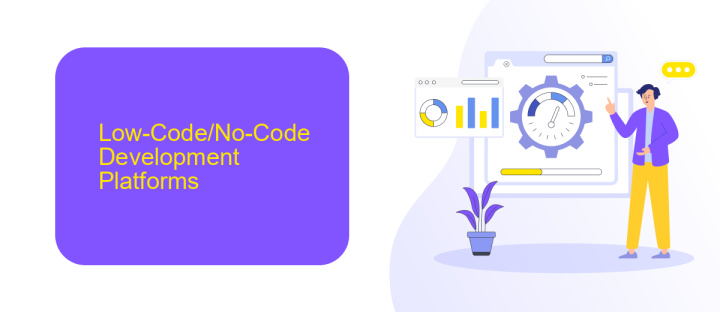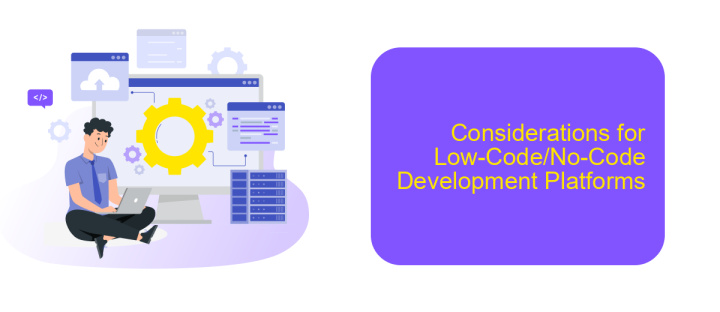Low-Code No-Code Development Platform
Low-Code No-Code (LCNC) development platforms are revolutionizing the way businesses approach software creation. By enabling users to build applications with minimal or no coding expertise, these platforms democratize the development process, reduce time-to-market, and lower costs. This article explores the key features, benefits, and potential challenges of adopting LCNC solutions in today's fast-paced digital landscape.
Introduction
The rise of Low-Code No-Code Development Platforms (LCNC) is transforming the way businesses approach software development. These platforms empower users with little to no programming knowledge to create applications through intuitive graphical interfaces. This democratization of software development is enabling faster innovation and reducing the dependency on specialized developers.
- Accelerated development cycles
- Reduced costs associated with hiring specialized developers
- Enhanced collaboration between technical and non-technical teams
- Greater flexibility and adaptability to changing business needs
One key aspect of LCNC platforms is their ability to seamlessly integrate with various services and applications. Tools like ApiX-Drive facilitate these integrations by providing a user-friendly interface to connect different systems without the need for extensive coding. This not only streamlines workflows but also ensures that data flows smoothly across different platforms, enhancing overall operational efficiency.
Low-Code/No-Code Development Platforms

Low-Code/No-Code development platforms empower users to create applications with minimal or no coding knowledge. These platforms provide visual interfaces, drag-and-drop tools, and pre-built templates that simplify the development process, enabling quicker deployment of applications. They are particularly beneficial for businesses looking to accelerate their digital transformation without the need for extensive programming expertise.
In addition to ease of use, these platforms often come with built-in integrations and automation capabilities. For instance, services like ApiX-Drive can seamlessly connect various applications and automate workflows, further enhancing productivity. By leveraging such tools, organizations can efficiently manage data transfers, synchronize systems, and streamline operations, thereby reducing manual effort and minimizing errors.
Benefits of Low-Code/No-Code Development Platforms

Low-code and no-code development platforms offer numerous advantages that make them appealing to businesses of all sizes. These platforms enable rapid application development, allowing organizations to respond quickly to market changes and customer needs. They also reduce the dependency on skilled developers, making it easier for non-technical staff to contribute to the development process.
- Speed and Efficiency: These platforms significantly reduce development time, enabling faster deployment of applications.
- Cost-Effective: Lower development and maintenance costs by minimizing the need for a large team of developers.
- Accessibility: Empower non-technical users to create applications, democratizing the development process.
- Integration Capabilities: Tools like ApiX-Drive facilitate seamless integration with various services, enhancing functionality.
- Scalability: Easily scale applications to meet growing business needs without extensive rework.
In summary, low-code and no-code platforms provide a versatile and efficient solution for modern businesses. By leveraging these platforms, companies can accelerate their digital transformation journey, reduce costs, and empower a broader range of employees to participate in application development. Services like ApiX-Drive further enhance these benefits by offering robust integration capabilities, ensuring that applications can easily connect with other essential business tools.
Considerations for Low-Code/No-Code Development Platforms

When considering low-code/no-code development platforms, it's essential to evaluate several key factors to ensure they align with your business needs. These platforms can significantly accelerate development, but they also come with their own set of challenges and limitations.
First, assess the scalability of the platform. While low-code/no-code solutions are excellent for rapid prototyping and small-scale applications, they may not always offer the robustness required for large-scale enterprise applications. Additionally, consider the platform's ability to integrate with existing systems and third-party services.
- Scalability: Can the platform handle growth and increased complexity?
- Integration: Does it support seamless integration with your current systems and external services like ApiX-Drive?
- Customization: Are there limitations on how much you can customize the applications?
- Security: Does the platform offer robust security features to protect sensitive data?
- Cost: What are the long-term costs associated with using the platform?
Finally, consider the support and community around the platform. A strong support system and active community can be invaluable for troubleshooting issues and sharing best practices. Conduct thorough research and possibly a trial run to ensure the platform meets all your requirements before making a commitment.
Conclusion
In conclusion, Low-Code No-Code Development Platforms are revolutionizing the way businesses approach software development. By enabling non-technical users to create and deploy applications, these platforms significantly reduce development time and costs. This democratization of application development empowers a broader range of individuals to contribute to digital transformation efforts within their organizations, fostering innovation and agility.
Moreover, the integration capabilities of these platforms, such as those offered by services like ApiX-Drive, enhance their utility by allowing seamless connectivity with various third-party applications and data sources. This ensures that businesses can maintain a cohesive and efficient workflow, further maximizing the benefits of Low-Code No-Code solutions. As these platforms continue to evolve, they will undoubtedly play a pivotal role in shaping the future of software development, making it more accessible and efficient for everyone.
FAQ
What is a Low-Code No-Code Development Platform?
Who can benefit from using Low-Code No-Code platforms?
What types of applications can be built using Low-Code No-Code platforms?
How do Low-Code No-Code platforms handle automation and integrations?
Are Low-Code No-Code platforms secure?
Do you want to achieve your goals in business, career and life faster and better? Do it with ApiX-Drive – a tool that will remove a significant part of the routine from workflows and free up additional time to achieve your goals. Test the capabilities of Apix-Drive for free – see for yourself the effectiveness of the tool.

